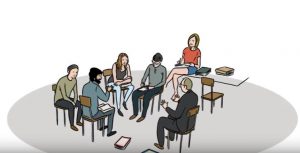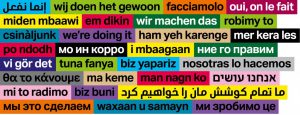
In the Fall semester of 2016, Bard College Berlin officially launched the Program in International Education and Social Change. PIESC aims at supporting students coming from areas of economic and political crisis who intend to take advantage of their liberal arts education to serve the public good. PIESC follows in the footsteps of PIE, the Program in International Education, established at Bard College in Annandale soon after the fall of the Berlin Wall. The original focus of PIE was to bring students from countries undergoing democratic transitions to Bard for a year to introduce them “to American political and social systems” while also learning from the students’ diverse experiences. PIESC differs from PIE in that it provides support for an entire four-year BA degree, and it incorporates the element of social change to which the recipient students must be committed. PIESC relies largely on financial contributions from donors and currently works in close partnership with the Scholarship Network, a fledgling fundraising initiative pioneered by the action alliance “Wir Machen Das.”
Three of the five recipients, Ahmad Mobaiyed, Muhanad Qaiconie and Wafa Mustafa, revealed their intentions for their liberal arts education with BCB: All are civically engaged and passionate about their plans.
Ahmad is currently enrolled in the EPST program and plans to major in politics. He didn’t seek out a liberal arts education in particular, but he “just wanted to go back to college as fast as possible.” “I didn’t have the motivation or the plan to learn German in order to study in German,” he says, “but I already knew English”. Before coming to BCB, he was enrolled with Kiron, an online educational platform providing courses to refugees. He planned on staying with Kiron for two years, but “it just happened that someone from Kiron told [him] about the scholarships that BCB was awarding to Syrian refugees.” He “was the very first student from Kiron who got [the] opportunity… to be a transfer student”. He describes how the scholarship from BCB was a big surprise and that everything “happened so quickly” from then on: He only had a week in which to make up his mind to enroll after he received the offer. “I was ready, but it was a big decision.”
After completing his BA, he hopes to have the opportunity to either complete an internship with an international NGO or pursue a Master’s degree in international relations.“If you have a degree in international relations … you can apply it internationally or help your country domestically with your international perspective,” he tells me. It is “always useful.” Though the future of Syria is far from certain, Ahmad hopes to return one day “to help rebuild the country.”
Wafa expresses similar hopes, saying that she thinks about going back all the time and still wonders if she made the right choice in coming to Germany: “Honestly, I would want to do anything and everything in Syria. The country is being destroyed. There will be lots to do … But I cannot make plans…[it] would likely to take years and years [before it is safe to go back again].” Though willing to do pretty much anything to help, her expertise and enthusiasm lie in journalism. Since she was fifteen, she knew she wanted to be a war journalist, reporting from the field. “But then the war came, and I wasn’t ready,” she says. She studied media and journalism for three years in Syria before they “kicked [her] out of university” for being arrested for her political activism. Shortly thereafter, she migrated to Turkey with her mother and sister where she found work to support them all. Undiscouraged in her career choice, she worked with the radio station, newspaper, and website — “sometimes all three at the same time… [for] 20 hours a day.” She is currently enrolled in the HAST program at BCB with the intention of majoring in ethics and politics. She hopes to establish a basic knowledge of politics and humanities and then resume her studies in media and journalism.
Muhanad Qaiconie is set on the same academic path as Wafa and is also interested in journalism. He studied English Literature in Syria for two years “before the revolution came and [he] became part of it.” With an evidently heavy heart, he explains that “what [he wants] is to find a solution” — not just for Syria, but for Israel and Palestine, too, and various other countries experiencing conflict. When asked if he thinks it is truly possible to find a solution, he rightly responds that “it’s impossible to continue this way.” How can we live with the rise of authoritarianism and the proliferation of war and death? “We must find another direction, another solution.” He tells how his Comparative Politics class has introduced him to models for conflict resolution and helped him understand patterns in history. For now, though, he doesn’t feel as if he belongs in Syria, and plans on remaining in Germany to establish “a good base for future learning” at BCB.
The Program in International Education and Social Change comes at a time of radical social change in Germany itself, following the influx of approximately 1 million refugees this past year alone. With the controversy surrounding Germany’s so-called “open-door policy,” it is imperative that we consider the role education has to play in shaping the future of German society and the value a liberal arts education has for successful integration, as well as our individual responsibilities within this framework.

The difficulty of integration stems in part from a fundamental misunderstanding of the term. As Marion Detjen, history professor at BCB and a driving force behind the Scholarship Network, taught in her “History of Migration” seminar this past semester, the common understanding of integration is closer to that of assimilation, where the burden of change falls on the incoming refugee. Thankfully, a more holistic definition has come to be considered in recent years that also realises the importance of the adaptability of the society at large and not only of the newcomer. This approach emphasises the need for society to make space for change if it is to ensure harmony between its members and take advantage of the skills and unique perspectives a refugee has to offer.
Unfortunately, it is to the former definition that the most recent legislature seems to adhere. A new integration law passed in May 2016 aims to encourage refugees to “learn enough German to be able to find a job and help pay for their living expenses.” They are required to undertake 100 hours of “integration courses” on “German culture, society, and values” as well as one of the 100 000 newly created low-wage jobs at the risk of having their welfare benefits cut. Though refugees are granted access to German public universities, where their applications are processed in the same way as an international student’s, they must be able to speak German fluently in order to enroll — no small barrier to the majority of prospective refugee students. Refugees are more likely to speak English upon arrival, which Muhanad describes as “the world language.”
The practical merits of the new integration law should not be overlooked, but the ideology which it embodies deserves closer scrutiny: This approach is problematic as it perpetuates an understanding of refugees as something alien and burdensome and does not address the necessity of societal change for integration. It tries only to fit the newcomers into already existing structures instead of promoting tolerance or cultural exchange. The non-acknowledgement that refugees, with all their superficial differences and core human similarities, are as intrinsic as any other member to a unified German society is crippling: In failing to recognize its own fluidity and adaptability, society itself disables such necessary change.
Education, especially a liberal arts education, can help address this misconception.
The benefit of higher education – be it public or private, specialized or broad – for both student and the society wherein education takes place is indisputable. Education is especially valuable to those like Wafa, Ahmad, and Muhanad as it endows them with greater social mobility by increasing their so-called human capital. On the one hand, education provides them with the tools to navigate through life in Germany successfully, and, on the other, it aids integration by inclining German society to be accommodating of (obviously passionate and skilled) newcomers.
According to Marion Detjen, a liberal arts education lends itself to meaningful professions like journalism or politics. Those seeking such an education at a German university will likely be disappointed as these fields are highly intellectualized and prohibitive; there is a greater focus on providing refugees access to technical disciplines like engineering or computer sciences. As German universities do not have adequate infrastructure to cater to an international student body, the professions which most inform and shape the opinions of German society are generally reserved for Germans; the voices of an entire demographic go largely unheard. “The liberal arts concept is really helpful in bringing refugees into positions to interpret what is important for all of us,” Marion asserts.
Kerry Bystrom, Associate Dean and professor at the college, gives further insight into BCB’s role in achieving the new vision of integration in Germany. Kerry reports that BCB is working with people “who are connected in their interests in making a different kind of German society.” Organisations like “Wir Machen Das” seek to challenge the mainstream vision of integration: Rather than asking migrants to fit into the already existing structures of German society, they value individual experiences in creating a society wherein everyone’s voices can be heard.
“BCB already has a student body where everyone is coming from everywhere and where we have to negotiate how to make a community together,” Kerry says. PIESC conceives that it is easier to come into such an environment where no one is considered an outsider. And, as BCB is a small, private institution, it is better equipped to meet individual student’s needs.
Of course, this doesn’t mean to say that the system is perfect. Wafa and Muhanad report that they weren’t quite prepared for the level of English that is required in their courses, but both are working hard to improve and find their own ways to participate in classroom discussions. Muhanad also points out that, though he finds great value in his education here, he wishes there was greater diversity in the curriculum which he finds to be very “Western.” He’d like to have the opportunity to take courses on countries like India and Pakistan. This is a struggle he shares with many other students at BCB and one that the college is continually working to address.
Still, Muhanad emphasizes that he is “really impressed” with the school. He compares it to the university he attended in Syria. There, more than 1000 students filled each lecture hall, and it was “okay” if you didn’t want to attend the classes. “But here we have the space to talk. Even if we don’t agree with the text or the other students, we can say it.”
If you are reading this, you are likely among those lucky few who luxuriate in the perception that it is your right to have your voice heard and listened to. It is too easy to forget the masses of others who do not enjoy this right. With it, there comes the responsibility to speak up while also giving space to others and listening to those voices who would otherwise go unheard. As Kerry says, PIESC is not just about bringing a US education to the rest of the world, but “all about exchange being a conversation … rather than trying to convince people to fit into one or the other side.” BCB’s institutional changes reflect those that must happen on a larger scale if German society is to admit that it is time to change for the better.
[hupso_hide]
